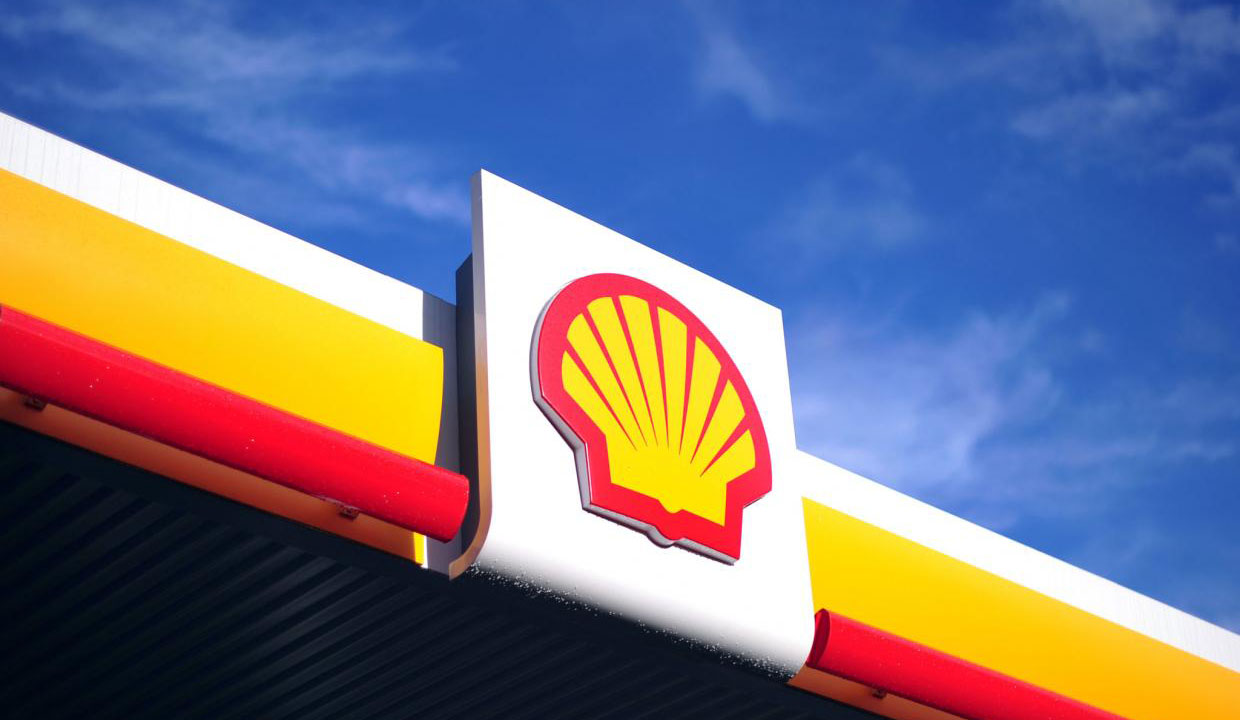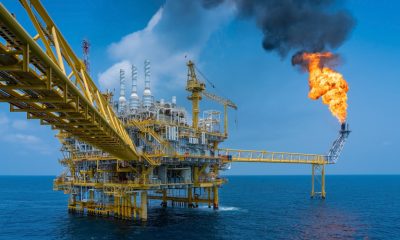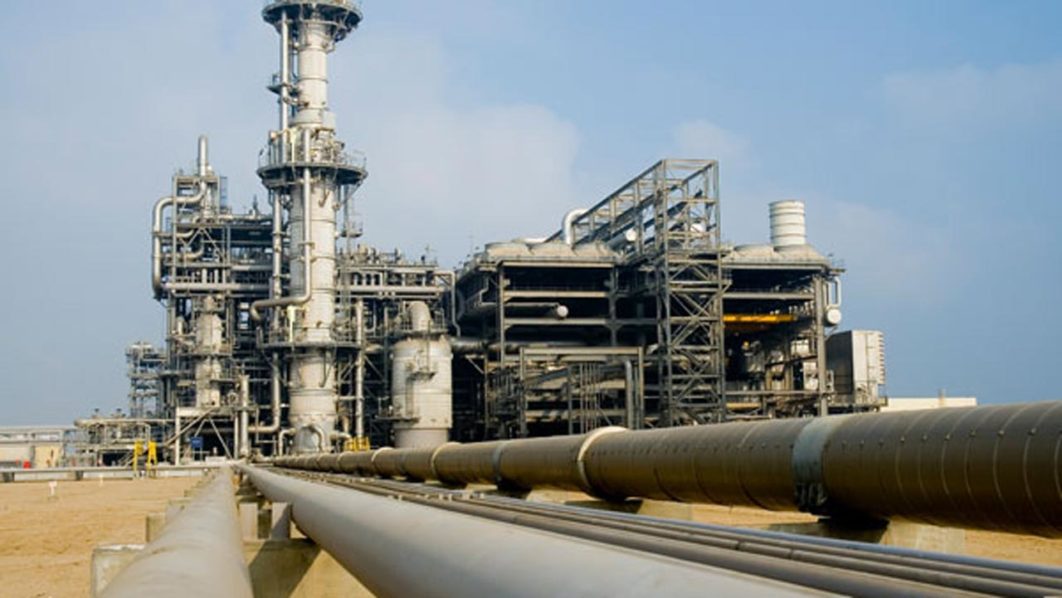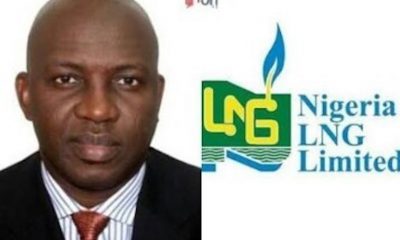Economy
NLNG Revenue Declines to $4.7b in 2016
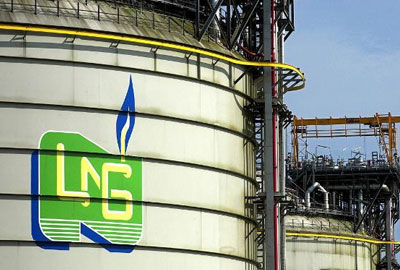
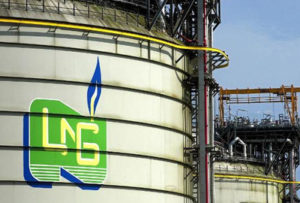
By Modupe Gbadeyanka
Nigeria Liquefied Natural Gas (NLNG) has released its unaudited financial statement for the year ended December 31, 2016, declaring a decline in its earnings for the period under review.
In the statements, the firm said its revenue slumped by 30.98 percent from $6.84 billion recorded in 2015 to $4.72 billion in 2016.
The company said despite the sharp drop in its revenue, its capital investment appreciated slightly by 1.98 per cent to $881.84 million from $864.76 million recorded in the previous year.
However, the drop in revenue, negatively affected its dividends payout, as it paid $737.086 million in dividends to its shareholders — the Nigerian National Petroleum Corporation (NNPC), Shell, Total and Eni 2016.
The amount paid as dividends in 2016 represented a 65.89 percent decline when compared to total dividends of $2.161 billion paid to shareholders in 2015.
In addition, the report pointed out that $717.72 million was expended by the NLNG to purchase gas from the NNPC in 2016, compared to $1.18 billion in the previous year, while $593.16 million worth of gas was purchased by the NLNG from Shell, Total, Agip and Conoco Philip in 2016, compared to $961.97 million in 2015.
The NLNG, according to the report, also paid local contractors $565.64 million for goods and services, dropping by 7.4 percent from $610.82 million paid out to local contractors in 2015.
To this end, the report stated that the NLNG had from 1999 to December 31, 2016, recorded total revenue of $95.09 billion; total capital investment of $16.57 billion; total dividends paid to the NNPC stood at $15.7 billion; while Shell, Total and Eni received $16.45 billion as total dividends in the 18-year period.
Also, NLNG’s total gas purchases from the NNPC from 1999 to 2016 stood at $12.588 billion; gas purchases from Shell, Total, Agip and Conoco Philip stood at $10.29 billion over the same period; while total payments to local contractors for goods and services from 1999 to 2016 stood at $5.66 billion.
The NLNG disclosed that in a proactive bid to discover more Nigerian sources, Nigerian Content surveys and vendor forums were conducted at scheduled intervals to identify indigenous companies capable of providing the goods and services required by NLNG.
It also stated that through its initiative to empower local contractors via the Finnima Legacy Project, five host community-based contractors had made capital investments in their companies thereby expanding their operating capacity, while it had also strategic partnerships between the more established Nigerian vendors and the community vendors.
The NLNG further disclosed that about 54 vendors had been trained at the Bonny Vocational Centre to improve their skills in business development and project management, while its deliberate strategies implemented to increase spend in some communities had led to a significant increase in year-on-year spend with direct spend increasing by over 100 percent between 2011 and 2013 and even further in 2014.
It said, “Doing business with Nigeria LNG has engendered improvement in some of our vendors’ business processes, and led them to upgrade their facilities and capacity to meet very stringent requirements.
“In the past, for instance, NLNG worked with Dorman Long Nigeria Limited and Nigerdock Nigeria PLC to enhance their galvanisation capability, with Nexans Kabelmetal to increase manufacturing capacity and with Nigerian Foundries to improve their processes for the manufacture of trench gratings and manhole covers.”
Economy
FG Targets Credit Access For 50% Workers By 2030

By Adedapo Adesanya
The Vice President, Mr Kashim Shettima, inaugurated the Board of the Nigerian Consumer Credit Corporation (CREDICORP) and gave a 50 per cent access target for workers, saying consumer credit was critical to Nigeria’s ambition of becoming a one-trillion-dollar economy by 2030.
According to him, President Bola Tinubu established the CREDICORP to build a trusted credit infrastructure, provide catalytic capital to lower borrowing costs, and help Nigerians overcome long-standing cultural resistance to credit.
Speaking on Thursday in Abuja when he inaugurated the board on behalf of the President, the Vice President, in a statement by his spokesman, Mr Stanley Nkwocha, said that the quality of life of Nigerians cannot improve without closing the gap between access to capital and human dignity.
“A civil servant who earns honestly does not have to chase sudden wealth just to buy a vehicle, or save for ten years to buy one. A young professional should not remain in darkness simply because solar power must be paid for all at once,” the Vice President said.
VP Shettima disclosed that in just one year of operations, CREDICORP has disbursed over ₦37 billion in consumer credit to more than 200,000 Nigerians, with over half of them accessing formal credit for the first time.
The Vice President said the organisation was specifically tasked with building credit infrastructure to bridge the trust gap between lenders and borrowers, providing wholesale capital and credit guarantees through its portfolio company.
“Ultimately, these critical jobs of CREDICORP will enable access to consumer credit to at least 50 per cent of working Nigerians by 2030,” he said.
The Vice President explained that the new board’s role was not ceremonial as they are custodians of the organisation’s mission, adding that the long-term strength of the institution would depend on their “vigilance, integrity, sacrifice, and commitment.”
He directed Board members to uphold Public Service Rules, the Board Charter, and all applicable governance frameworks, warning that accountability and stewardship of public resources were non-negotiable.
The Chairman of CREDICORP, Mr Aderemi Abdul, expressed appreciation to President Tinubu for his vision behind the formation of CREDICORP and for the confidence reposed in them, noting that the establishment of the corporation marked an important step towards strengthening the nation’s financial architecture.
He assured President Tinubu that the board understands its responsibility and will guide the institution to deliver meaningful benefits to Nigerians.
For his part, Mr Uzoma Nwagba, Managing Director/CEO of CREDICORP, recalled watching President Tinubu say 20 years ago that consumer credit is one of the major tools that will improve the lives of Nigerians.
He noted that over the past 18 months, the institution has benefited more than 200,000 Nigerians, including students.
He assured that the presidential vision behind CREDICORP would not be taken lightly, as the team considers their appointments a unique, once-in-a-lifetime opportunity.
Other members of the board inaugurated include Mrs Olanike Kolawole, Executive Director, Operations; Mrs Aisha Abdullahi, Executive Director, Credit and Portfolio Management; Mr Armstrong Ume-Takang (MD, MoFI), Representative of MoFI; Mrs Bisoye Coke-Odusote (DG, NIMC), Representative of NIMC; and Mr Mohammed Naziru Abbas, Representative of FMITI.
Others are Mr Marvin Nadah, Representative of FCCPC; Mrs Chinonyelum Ndidi, Representative of the Federal Ministry of Finance; Mr Mohammed Abbas Jega, Independent Director; and Mrs Toyin Adeniji, Independent Director.
Economy
NASD OTC Exchange Rallies 0.23% as Nipco Leads Six Advancers

By Adedapo Adesanya
Six price gainers helped the NASD Over-the-Counter (OTC) Securities Exchange retain its stay in green territory after a 0.23 per cent appreciation on Thursday, February 26.
The price gainers were led by Nipco Plc, which added N25.00 to close at N278.00 per share compared with the previous day’s N253.00 per share, NASD Plc rose by N5.13 to N56.41 per unit versus N51.28 per unit, FrieslandCampina Wamco Nigeria Plc expanded by N2.24 to N102.44 per share from N100.00 per share, Afriland Properties Plc grew by 88 Kobo to N18.88 per unit from N18.00 per unit, 11 Plc increased by 35 Kobo to N277.00 per share from N276.65 per share, and Lagos Building Investment Company (LBIC) Plc gained 27 Kobo to close at N3.75 per unit versus N3.48 per unit.
On the flip side, Central Securities Clearing System (CSCS) Plc lost N1.75 to sell at N68.25 per share versus N70.00 per share, and Geo-Fluids Plc depreciated by 2 Kobo to N3.25 per unit from N3.27 per unit.
The weight of the advancers fortified the NASD Unlisted Security Index (NSI) by 9.21 points to 4,034.46 points from 4,025.25 points, and the market capitalisation soared by N5.51 billion to N2.413 trillion from Wednesday’s N2.408 trillion.
Yesterday, the transaction value jumped by 18.8 per cent to N102.8 million from N80.7 million, and the number of deals surged by 18,8 per cent to 38 deals from 32 deals, while the transaction volume went down by 84.9 per cent to 1.3 million units from 8.7 million units.
At the close of business, CSCS Plc was the most traded stock by value (year-to-date) with 34.2 million units worth N2.04 billion, followed by Okitipupa Plc with 6.3 million units sold for N1.1 billion, and Geo-Fluids Plc with 122.1 million units valued at N478.2 million.
Resourcery Plc remained as the most traded stock by volume (year-to-date) with 1.05 billion units exchanged for N408.7 million, trailed by Geo-Fluids Plc with 122.1 million worth N478.2 million, and CSCS Plc with 34.2 million units traded for N2.04 billion.
Economy
Naira Down Again at NAFEX, Trades N1,359/$1

By Adedapo Adesanya
The Naira further weakened against the Dollar in the Nigerian Autonomous Foreign Exchange Market (NAFEX) for the fourth straight session this week on Thursday, February 26.
At the official market yesterday, the Nigerian Naira lost N3.71 or 0.27 per cent to trade at N1,359.82/$1 compared with the previous session’s N1,356.11/$1.
In the same vein, the local currency depreciated against the Pound Sterling in the same market window on Thursday by N8.27 to close at N1,843.23/£1 versus Wednesday’s closing price of N1,834.96/£1, and against the Euro, it crashed by N8.30 to quote at N1,606.89/€1, in contrast to the midweek’s closing price of N1,598.59/€1.
But at the GTBank forex desk, the exchange rate of the Naira to the Dollar remained unchanged at N1,367/$1, and also at the parallel market, it maintained stability at N1,365/$1.
The continuation of the decline of the Nigerian currency is attributed to a surge in foreign payments that have outpaced the available Dollars in the FX market.
In a move to address the ongoing shortfall at the official window, the Central Bank of Nigeria (CBN) intervened by selling $100 million to banks and dealers on Tuesday.
However, the FX support failed to reverse the trend, though analysts see no cause for alarm, given that the authority recently mopped up foreign currency to achieve balance and it is still within the expected trading range of N1,350 and N1,450/$1.
As for the cryptocurrency market, major tokens posted losses over the last 24 hours as traders continued to de-risk alongside equities following Nvidia’s earnings-driven pullback, with Ripple (XRP) down by 2.7 per cent to $1.40, and Dogecoin (DOGE) down by 1.6 per cent to $0.0098.
Further, Litecoin (LTC) declined by 1.3 per cent to $55.87, Ethereum (ETH) slipped by 0.9 per cent to $2,036.89, Bitcoin (BTC) tumbled by 0.7 per cent to $67,708.21, Cardano (ADA) slumped by 0.6 per cent to $0.2924, and Solana (SOL) depreciated by 0.4 per cent to $87.22, while Binance Coin (BNB) gained 0.4 per cent to sell for $629.95, with the US Dollar Tether (USDT) and the US Dollar Coin (USDC) closing flat at $1.00 each.
-

 Feature/OPED6 years ago
Feature/OPED6 years agoDavos was Different this year
-
Travel/Tourism10 years ago
Lagos Seals Western Lodge Hotel In Ikorodu
-

 Showbiz3 years ago
Showbiz3 years agoEstranged Lover Releases Videos of Empress Njamah Bathing
-

 Banking8 years ago
Banking8 years agoSort Codes of GTBank Branches in Nigeria
-

 Economy3 years ago
Economy3 years agoSubsidy Removal: CNG at N130 Per Litre Cheaper Than Petrol—IPMAN
-

 Banking3 years ago
Banking3 years agoSort Codes of UBA Branches in Nigeria
-

 Banking3 years ago
Banking3 years agoFirst Bank Announces Planned Downtime
-

 Sports3 years ago
Sports3 years agoHighest Paid Nigerian Footballer – How Much Do Nigerian Footballers Earn



